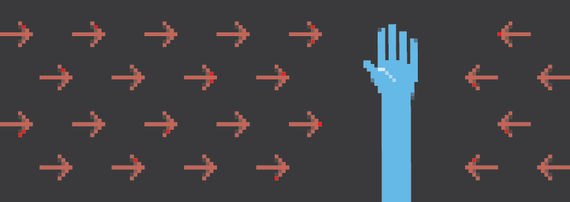Few events are more disturbing to decent people than a wolf pack's anonymous attack on an individual. In the age of the internet, this happens when one person is descended upon by a huge volume of threats or action perpetrated by many. Usually the attackers remain anonymous. The anonymity is comforting to the attackers and indescribably frightening to the victim. That is intentional.
The most recent incarnation of this criminal phenomenon is the growth of the hashtag #GamerGate, and it shows why we need a better process for handling criminal behavior, especially online. The problem: unless these crimes are reported to federal authorities, there is little law enforcement can do to respond.
The hashtag #GamerGate thrives on the fear of vengeance. The #GamerGate movement's self-proclaimed predication is the idea that journalistic ethics have been compromised by close relationships between those who review video games and those who create video games. Those supporting #GamerGate believe their whole culture is at risk from threats of censorship.
But from the outside, the #GamerGate movement appears to be about a fear that violent video games with oversexualized female characters will be banished in the name of political correctness. And in the name of #GamerGate, journalists and game developers, mainly women, have faced unrelenting online harassment.
I leave the debate about the effects of political correctness to others.
However, as an economist and criminologist, I care about how and how well our justice system responds when people are victims of crime. No matter the legitimacy of #GamerGaters' principal concern, individuals have been harassed by volumes of conspirators acting under the auspices of #GamerGate. People have been driven from their homes by threats of rape and homicide. Events have been cancelled by threats of mass murder.
This is clearly criminal behavior and many individuals have therefore been victims of a crime.
Regardless of where you stand on #GamerGate, online threats of rape and murder are all federal crimes. Several events associated with #GamerGate are likely felonious, potentially punishable by long prison terms in federal penitentiaries.
So, why have there been no prosecutions? A big part of the answer, I suspect, is that no victims have reported the crimes they have experienced.
The United States does a lousy job recording crime statistics. The two main national sources of crime data, the National Crime Victimization Survey (NCVS), which asks a representative sample of Americans about their experiences with crime, and the Uniform Crime Report (UCR), which tallies local law enforcement reports about the number of crimes reported each month, are both deeply flawed. (Aside: they are flawed because of local resistance to better data collection rather than federal malfeasance.)
But what we do know is that the NCVS victimization survey records about three times as many violent crimes as the UCR data collected from police. That means three times as many Americans are willing to report in a survey that they were victimized than are willing to report those crimes to the police.
Why don't people report their victimization? In many cases the answer is fear: fear of reprisal, fear of new victimization, fear of the wolf pack.
But there is a solution. If you are threatened or harassed by #GamerGaters or others, you need to report it to the FBI, not your local law enforcement, which has few resources to investigate and prosecute such matters.
The FBI cannot prosecute a case without a victim. If you have been a victim of the anonymous #GamerGate mob, let them know. The National Center for Victims of Crime can help too.
Without reporting, there will be no investigations and prosecutions -- and there will be no data. Without data, we can't understand how these types of crimes take place, how they spread virally through social networks, or how they are organized. Without this type of research, it will be much harder to prevent these types of crimes in the future.
Illustration: Adrienne Hapanowicz/Urban Institute.
